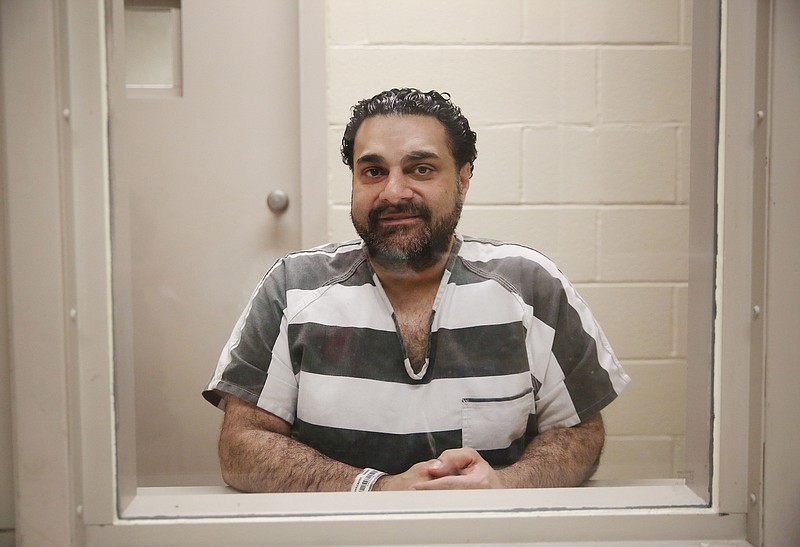DALLAS-Babak Taherzadeh is a troll.
One of his Twitter personas boasts the bio: "im smarter than u unless you are really smart."
He claims he has a "different sense of humor." He peppers his tweets with profanity. He plays an online character, one he says doesn't reflect who he really is.
That character got him into trouble.
Taherzadeh sits in the Dallas County jail, where he has been since June, on a felony stalking charge. He is accused of using social media to harass a judge who oversaw a criminal case against him.
Before his arrest, he regularly commented online on political issues and public figures.
Taherzadeh believes he was exercising his rights to free speech and to petition the government when he posted negative comments on social media about a state district judge.
But authorities see it differently. They say Taherzadeh's tweets threatened physical harm.
The arrest warrant affidavit says Judge Brandon Birmingham "is in fear for the life of his family and for his own" because of Taherzadeh's messages and social media posts.
The case against Taherzadeh shows the limits of free speech.
The First Amendment protects freedom of speech, religion, the press, the right to assemble and to petition the government, and it prevents the government from punishing people who exercise those rights.
And though hate speech is protected, there is a line when a person's safety is threatened, legal experts say.
"It's always been a huge tension there, the concerns about safety versus having an open dialogue and being able to criticize public officials," said Lata Nott, executive director of the First Amendment Center.
Court records show that Taherzadeh used at least 10 Twitter accounts to stalk Birmingham and the judge's family. Birmingham, who presides over the a District Court in Dallas County, had overseen a harassment case against Taherzadeh. The judge declined to comment.
Taherzadeh claims Birmingham mishandled the case against him and unfairly jailed him. He took to Twitter to express his frustration.
Records show Taherzadeh tweeted on June 8: "Wanna see me bitch slap a State District Judge? I am not one to trifle with."
He also tweeted about Birmingham's wife and children. He spoke out against the Dallas Police Association and a Dallas detective.
Taherzadeh says he regrets the cruder tweets of his that landed him in jail. He says he didn't mean them to be taken seriously. And while he sits in jail, he most misses his family, a word he repeats seven times.
But his family was afraid of him.
He had grown obsessive about a debt he believes he was owed. His family said he started spiraling after he was evicted and he started demanding money from his brother-in-law, court records show.
Taherzadeh was indicted in April 2014 on a harassment charge for threatening to kill his brother-in-law via text messages. Even after his arrest, Taherzadeh continued to email his brother-in-law.
"I wanted my money, yeah, I was really bothering him about it. I was trying to make a point," he says, but says he would've never hurt his relatives.
In June 2015, Birmingham ruled that Taherzadeh had violated his bond requirements by sending more emails to his brother-in-law. As a compromise, the judge ordered Taherzadeh to stay off social media and email, records show.
By September, Taherzadeh was tweeting again: "radleybalko this guy JudgeBirmingham is the guy who threatened me with jail for using social media." Birmingham recused himself from Taherzadeh's case in October, and Taherzadeh pleaded guilty to the misdemeanor harassment charge in February. He was sentenced to 100 days in county jail.
But once out, Taherzadeh started tweeting again.
He sent a tweet that included the phrase, "pray for the death of JudgeBirmingham."
Though he insists he never meant any of his online statements to be considered real threats, his online statements toed the line of his constitutional rights.
Legal experts say hate speech is protected. Ugly speech is protected. Profane speech is protected. You can criticize the government and public officials. There is even leeway for obvious hyperbole and joking about violence.
"Obviously there is a right to criticize the government, even to criticize the government very harshly and criticize a public official harshly," said Dale Carpenter, a professor at the Southern Methodist University Dedman School of Law.
But that right is limited once you issue a "true threat" against any person, even a government official, such as a judge.
"If you put a person in fear that you are going to do them physical harm, that is not protected speech," Carpenter said.
With technological advances, more people are aware of what others are saying online. Facebook and Twitter and other social media platforms are the modern gathering places.
"Now thousands of people can know it and react to it instantaneously," Carpenter said.
And many people believe they are protected from criticism because of the Bill of Rights.
But Twitter and Facebook can delete your posts and tweets. News organizations can delete offensive comments that other readers have flagged as inappropriate or hateful.
"Private persons and private organizations are perfectly free to criticize you for your speech," Carpenter said. "When they are critical of you, they are not violating the First Amendment."
But Taherzadeh isn't mad his Twitter accounts were suspended. He believes he is being punished solely for speaking out against an elected official.
"This is America. This is the reason why my parents put me on a boat and floated me, oh wait, that was Elian Gonzalez," he says, laughing.
Take note of his humor. In truth, Taherzadeh is a U.S. citizen who moved here from Iran with his parents when he was 3.
"You come to America, you think it's all about freedom and stuff and you criticize a judge and you're in jail, I mean, is it only for white people?"

